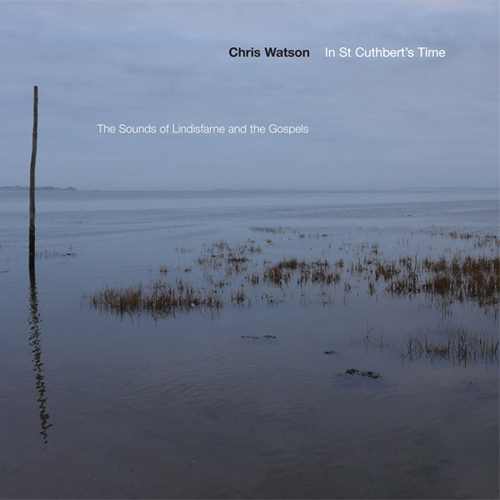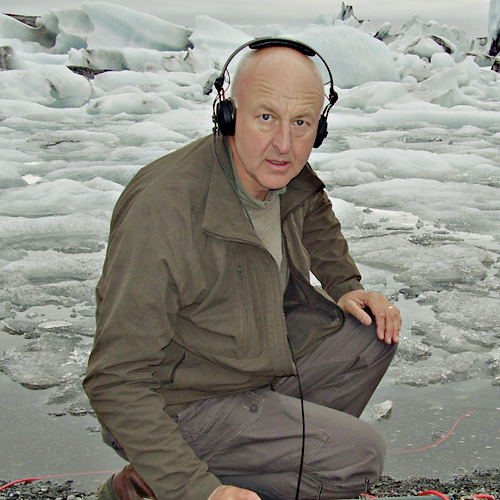In St Cuthbert’s Time. CHRIS WATSON
(Touch 2013)
Review by Patrick Farmer
The Sound of Lindisfarne and the Gospels.. A 7th century soundscape of Lindisfarne.
I can’t ever seem to treat a field recording as a field recording, but what the hell is a field recording anyway?
Are there sets of listening principles that govern us when faced with a field recording?
Surely recording should be plural?
I am faced with as much my own auditory prejudices as those of Watson’s.
I have no desire to describe what occurs over the four tracks.
I’ve listened to these four tracks on a bus, a train, in a coffee shop, whilst walking, and on my system at home. Each time I felt the sounds therein were better suited to an unapproachable, almost playful, sense of abstraction. When I say better suited, I mean I prefer to treat them as sounds entirely distinct from the concept upon which Watson lays them. The concept, or ideology, I’ll get to later.
Considering my lack of familiarity with the electronic environments encoded onto this plastic CD, I am more than happy to just sit and listen. At times it’s as if the all pervasive solids and liquids emanate from a latent attraction of an upright piano stood in the path of a bus. The former lying down in the belly of the latter. Their bodies resounding. For me this is abstract electronic music. Leading me to listen as intently as possible to this disc, as sounds, rather than as any form of nature, re-presented or re-imagined.
I feel more than a paunch of distaste when considering the concept saddled to this CD (of which I’ll come back to). Watson states, or muses, that the sounds herein are a representation of the Holy Isle, Lindisfarne, some 1300 years ago. Unease… How is it that one can listen to this over electronic speakers, through whatever electronic device is preferred, and ultimately made, with electronic equipment, the modernist of the modern!
This is not a case of a prerequisite willing suspension of disbelief. Nothing here seems to be paraded as a fiction. I feel it’s best to approach this as Watson’s representation of a 7th century soundscape, in mind of the old seesaw, writing about oneself writing about nature.
Microphones are not ears, and we, at least I, do not listen, and certainly do not hear, sequentially, which to my mind, is exactly the manner upon which the segments are here laid flat. This is not my telling anyone how to listen, listening, is not my issue here, neither are the flattened sounds.
We have a way to go (I hesitantly speculate) before the represented soundworld of In St Cuthbert’s Time is even a relative truth. Beyond the seemingly obvious parochialism of experiencing it (as it supposedly existed then) as it emanates from equipment that logically speaking is part of the posited problem (as it exists now).
As I’ve already said, I’ve not visited the area, so how much work Watson had to do, both on location and off, to eradicate the presence of the modern from that which is displayed is unknown. If I were to criticise this choice, which I am actually not (much more so the intent that comes tattooed onto it’s body – though this also lends itself to a total evaporation of the various, usually, omnipresent modern threads), then I would surely be plastering my horrible projective wares of (what a field recording should be) over Watson’s hands. No sir. Does a field recording need to meet tacit standards of a realist ecology?
This is an incredibly polite recording, a representation of well-mannered love, like De-Quincey without the opium, or Wordsworth without his legs. It has much more in common say, with the bucolic wanderlust of John Clare, or the landscapes of John Constable, than any relevant contemporary examples I can muster, like the poet J.H. Prynne or the painter Euan Uglow. And so where are we? Or why is it? This is not to say that a work need necessarily reflect the period in which it exists, but the stark juxtaposition of technology and a concept that speaks of an unnerving recollected escapism, can do nothing but disturb these fatigued concerns.
In St Cuthbert’s Time attempts to impossibly exist in a past wholly reliant on the present. I’m beginning to know how Doc Brown felt when he went Back to the Future.
[Chris Watson; photo courtesy of Touch]



